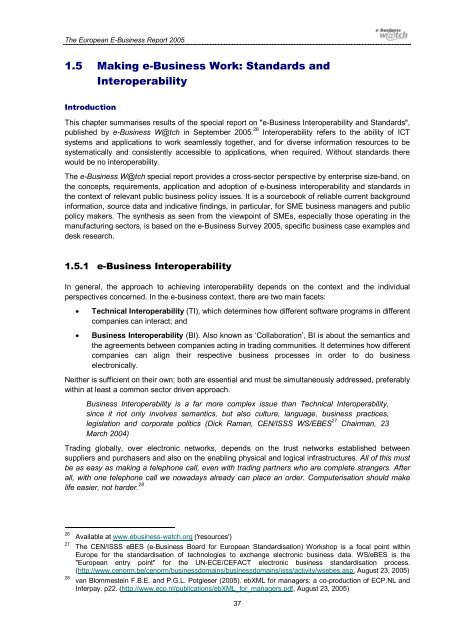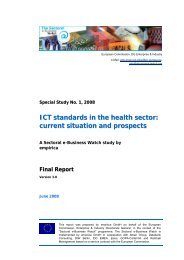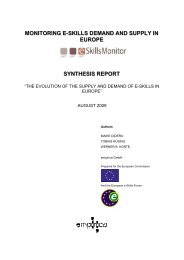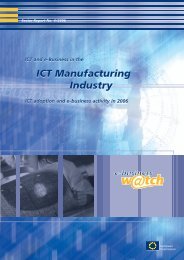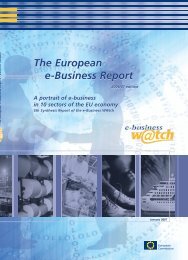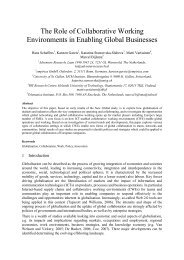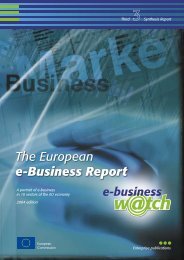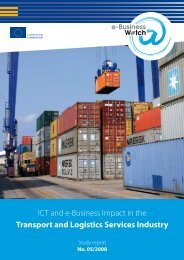The European e-Business Report The European e ... - empirica
The European e-Business Report The European e ... - empirica
The European e-Business Report The European e ... - empirica
You also want an ePaper? Increase the reach of your titles
YUMPU automatically turns print PDFs into web optimized ePapers that Google loves.
<strong>The</strong> <strong>European</strong> E-<strong>Business</strong> <strong>Report</strong> 2005<br />
1.5 Making e-<strong>Business</strong> Work: Standards and<br />
Interoperability<br />
Introduction<br />
This chapter summarises results of the special report on "e-<strong>Business</strong> Interoperability and Standards",<br />
published by e-<strong>Business</strong> W@tch in September 2005. 26 Interoperability refers to the ability of ICT<br />
systems and applications to work seamlessly together, and for diverse information resources to be<br />
systematically and consistently accessible to applications, when required. Without standards there<br />
would be no interoperability.<br />
<strong>The</strong> e-<strong>Business</strong> W@tch special report provides a cross-sector perspective by enterprise size-band, on<br />
the concepts, requirements, application and adoption of e-business interoperability and standards in<br />
the context of relevant public business policy issues. It is a sourcebook of reliable current background<br />
information, source data and indicative findings, in particular, for SME business managers and public<br />
policy makers. <strong>The</strong> synthesis as seen from the viewpoint of SMEs, especially those operating in the<br />
manufacturing sectors, is based on the e-<strong>Business</strong> Survey 2005, specific business case examples and<br />
desk research.<br />
1.5.1 e-<strong>Business</strong> Interoperability<br />
In general, the approach to achieving interoperability depends on the context and the individual<br />
perspectives concerned. In the e-business context, there are two main facets:<br />
• Technical Interoperability (TI), which determines how different software programs in different<br />
companies can interact; and<br />
• <strong>Business</strong> Interoperability (BI). Also known as ‘Collaboration’, BI is about the semantics and<br />
the agreements between companies acting in trading communities. It determines how different<br />
companies can align their respective business processes in order to do business<br />
electronically.<br />
Neither is sufficient on their own; both are essential and must be simultaneously addressed, preferably<br />
within at least a common sector driven approach.<br />
<strong>Business</strong> Interoperability is a far more complex issue than Technical Interoperability,<br />
since it not only involves semantics, but also culture, language, business practices,<br />
legislation and corporate politics (Dick Raman, CEN/ISSS WS/EBES 27 Chairman, 23<br />
March 2004)<br />
Trading globally, over electronic networks, depends on the trust networks established between<br />
suppliers and purchasers and also on the enabling physical and logical infrastructures. All of this must<br />
be as easy as making a telephone call, even with trading partners who are complete strangers. After<br />
all, with one telephone call we nowadays already can place an order. Computerisation should make<br />
life easier, not harder. 28<br />
26<br />
27<br />
28<br />
Available at www.ebusiness-watch.org ('resources')<br />
<strong>The</strong> CEN/ISSS eBES (e-<strong>Business</strong> Board for <strong>European</strong> Standardisation) Workshop is a focal point within<br />
Europe for the standardisation of technologies to exchange electronic business data. WS/eBES is the<br />
"<strong>European</strong> entry point" for the UN-ECE/CEFACT electronic business standardisation process.<br />
(http://www.cenorm.be/cenorm/businessdomains/businessdomains/isss/activity/wsebes.asp, August 23, 2005)<br />
van Blommestein F.B.E. and P.G.L. Potgieser (2005). ebXML for managers: a co-production of ECP.NL and<br />
Interpay. p22. (http://www.ecp.nl/publications/ebXML_for_managers.pdf, August 23, 2005)<br />
37


